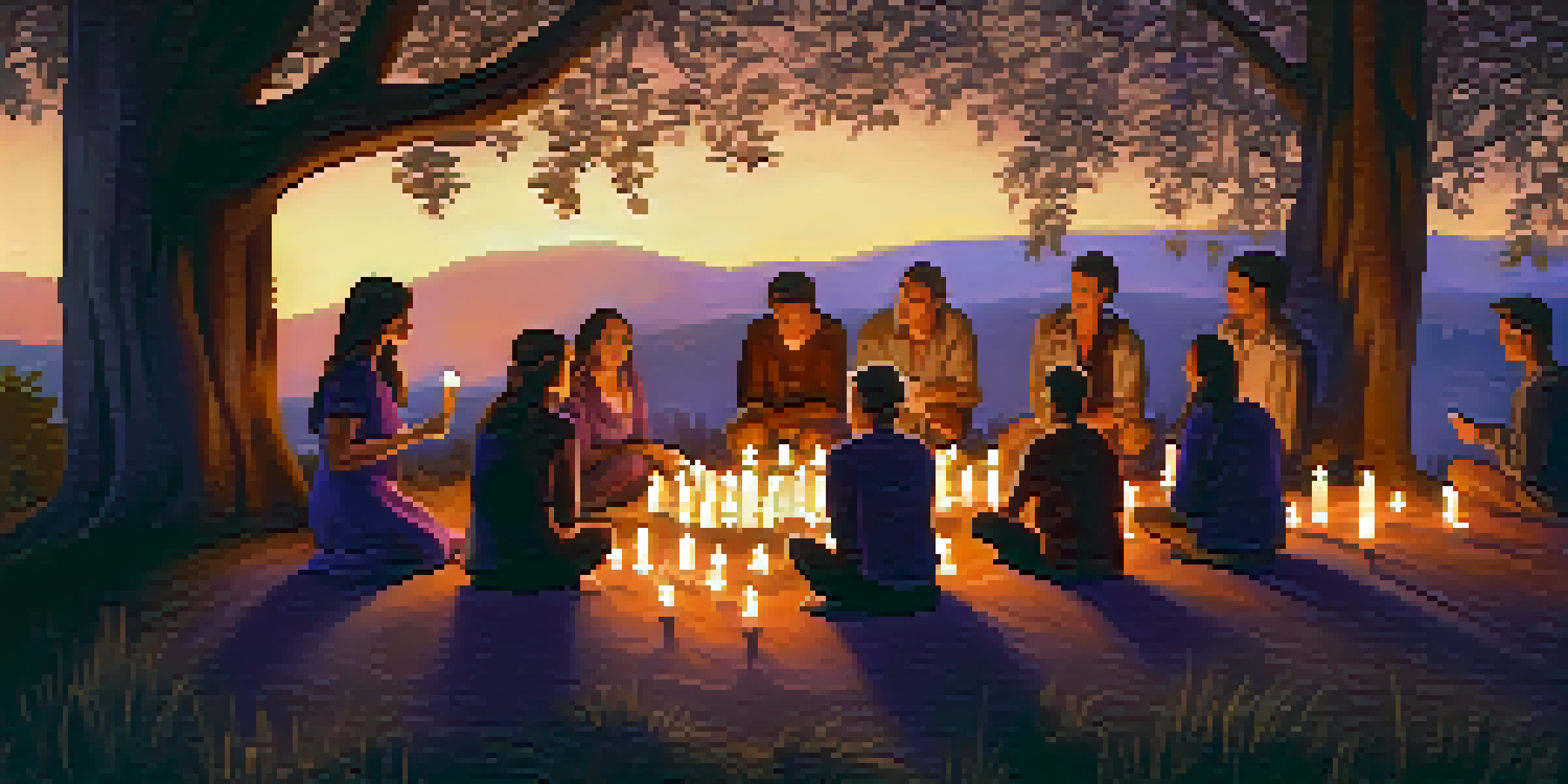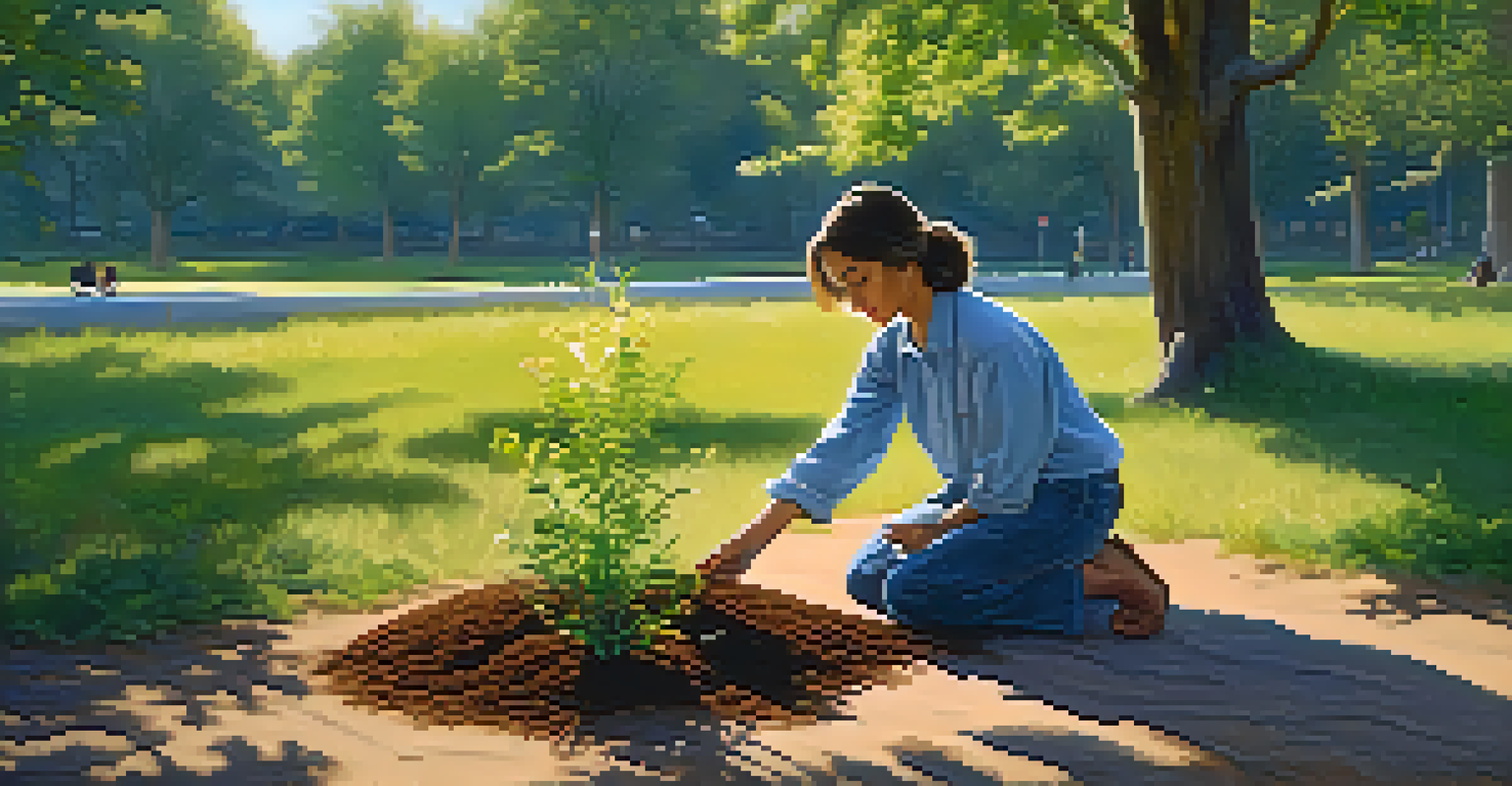Rituals and Their Importance in Grieving Process

What Are Rituals and Why Do They Matter?
Rituals are structured, symbolic actions that often hold cultural or personal significance. They can range from formal ceremonies, like funerals, to simple acts, such as lighting a candle in memory of a loved one. These practices provide a framework for expressing emotions, making them essential during the grieving process.
Rituals are important because they help us to connect with our past and give us a sense of continuity.
When someone we love passes away, the world can feel chaotic and overwhelming. Rituals serve as a familiar anchor, helping us to navigate the turbulent waters of grief. They create a sense of order amidst confusion, allowing us to honor our loved ones while processing our feelings.
Additionally, rituals can foster a connection to our community, as they often involve shared experiences with family and friends. This collective mourning can alleviate feelings of isolation, reminding us that we are not alone in our grief.
Types of Rituals Commonly Used in Grieving
There are numerous types of rituals that people use to cope with loss, each serving different purposes. Traditional ceremonies, like funerals or memorial services, provide a formal setting to honor a deceased person's life and legacy. These gatherings often include eulogies, music, and shared memories, creating a collective space for mourning.

On a more personal level, individuals might engage in rituals such as writing letters to the deceased, planting a tree in their memory, or visiting their favorite places. These acts can help individuals express their feelings and maintain a connection with the person they've lost.
Rituals Provide Grief Support
Rituals serve as structured, symbolic actions that help individuals express emotions and navigate the complexities of grief.
Cultural rituals also play a significant role in the grieving process. For instance, some cultures have specific mourning periods or unique ceremonies that help individuals process their grief within a cultural context, reinforcing a sense of belonging and continuity.
The Psychological Benefits of Grieving Rituals
Engaging in rituals during grief can provide significant psychological benefits. They allow individuals to express emotions that may be difficult to articulate, such as sadness, anger, or confusion. By participating in rituals, people can externalize their internal experiences, making it easier to cope with their feelings.
Grief is not a sign of weakness, nor a lack of faith... It is the price of love.
Moreover, rituals can promote healing by creating a safe space for reflection and remembrance. This intentional time dedicated to honoring a loved one can lead to meaningful insights and help individuals find closure over time. It encourages a shift from simply mourning to celebrating the life of the deceased.
In addition, the act of performing rituals can foster resilience, helping individuals develop coping strategies for dealing with future loss. By establishing a routine around grief, people can navigate their emotions more effectively and feel more empowered in their healing journey.
How Rituals Facilitate Connection with Others
Rituals often serve as a bridge between individuals and their communities, fostering connection during times of loss. When people come together for a common purpose, such as a memorial service or a candlelight vigil, it reinforces a sense of solidarity and shared experience. This communal support can be incredibly comforting for those grieving.
Sharing stories and memories during these rituals allows individuals to feel seen and understood. It validates their experiences while also providing an opportunity for others to express their own grief. This exchange can create deeper bonds among friends and family, strengthening relationships during difficult times.
Community Connection Through Rituals
Engaging in rituals fosters a sense of solidarity and shared experience, alleviating feelings of isolation during the grieving process.
Furthermore, rituals can encourage ongoing support beyond the initial grieving period. By establishing traditions, such as annual remembrances, individuals can cultivate lasting connections with those who understand their loss, ensuring that the memory of their loved one remains alive within the community.
Personalizing Rituals to Fit Individual Needs
While traditional rituals can provide comfort, it's important to remember that grieving is a deeply personal journey. Personalizing rituals to reflect the unique relationship one had with the deceased can enhance their significance. This could mean incorporating favorite songs, foods, or activities that were meaningful to the lost loved one.
Creating new rituals can also be a powerful way to honor a loved one. For instance, starting a new tradition, like a yearly hike in their favorite park or volunteering for a cause they cared about, can keep their spirit alive while allowing the bereaved to process their grief in a constructive manner.
Ultimately, the key is to ensure that the rituals resonate with the individual’s feelings and experiences. By tailoring these practices, people can find deeper meaning and solace in their grieving process, making it feel more authentic and supportive.
Challenges in Establishing Rituals During Grief
Despite the benefits, some individuals may struggle to establish rituals during their grieving process. Emotional pain can sometimes feel overwhelming, making it difficult to engage in activities that require effort or planning. This can lead to feelings of guilt or frustration, as they may feel they should be honoring their loved one more actively.
Additionally, societal expectations around grief can complicate the process. People may feel pressured to conform to certain rituals or timelines, leading them to suppress their own needs and preferences. It's crucial to recognize that there’s no ‘right’ way to grieve, and everyone’s journey is unique.
Personalizing Grief Rituals Matters
Tailoring rituals to reflect individual relationships with the deceased enhances their significance and provides deeper emotional support.
Addressing these challenges often requires patience and self-compassion. Seeking support from understanding friends or professionals can help individuals navigate their emotions and establish rituals that feel meaningful without the added pressure of societal norms.
The Role of Memory in Grieving Rituals
Memory plays a vital role in grieving rituals, as they often serve as a way to commemorate and celebrate the life of the deceased. Through stories, photographs, and shared experiences, rituals help keep the memory of a loved one alive. Engaging in these practices can evoke both joyful and sorrowful feelings, creating a balanced space for reflection.
Incorporating elements that remind individuals of their loved one can provide comfort and a sense of connection. For instance, displaying cherished belongings or creating a memory wall during a gathering can spark discussions filled with laughter and tears alike, highlighting the complexity of grief.

Ultimately, the relationship between memory and ritual is powerful. By intentionally recalling moments shared with the deceased, individuals can honor their legacy while processing their own grief, allowing for healing and growth as they move forward.